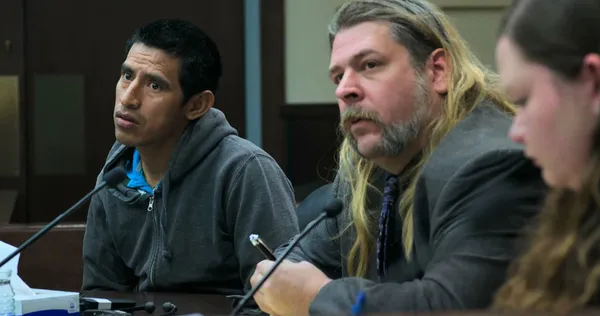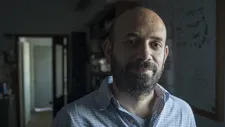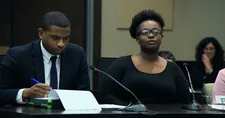 |
| Antonio Méndez Esparza on Courtroom 3H: 'I think the only reason why the movie exists, from a legal standpoint, is because it's transparent' |
Spanish director Antonio Méndez Esparza's documentary Courtroom 3H steps inside the family courts of Florida to take a look at the way the system operates. The director - who previously won the Independent Spirit John Cassavetes Award for Life And Nothing More - takes a fly-on-the-wall approach to the Tallahassee court, first following a number of cases before the second part of the film zeroes in on two specific sets of proceedings. The court takes a rehabilitation approach to family relationships, aiming to keep parents and children together where possible - while still stepping in when it isn't - and the film offers a clear-eyed view of the legal process and the challenges of judging cases.
We caught up with the director ahead of the film's screening at AFI Docs to talk about the inspiration behind and the process of making it.
Life And Nothing More, a drama about a single mother and her son whose father is in jail, is also, in some ways about the resilience of family and Esparza says that's always been a thing that is present in his work. He said he was moved to make the film but "looking at those families sitting on the bench, waiting for the state to make decisions". This might not involve immediate removal but it could lead to parents having to attend drug testing and counselling.
 |
| Antonio Méndez Esparza: 'We wanted to show the resilience and families making choices' |
He says: "We shot over two months without too much structure. We were just sitting and looking. And the thing that, to me, made a bit of a union was families fighting for what they felt was right, that was the core of it, that resistance. And then making choices - even, in some cases, when they give up the rights to the kids. That's their choice, right? I mean, of course, you don't know, maybe the case is doomed to fail, they don't have any other option. But still, they decide instead of going to a trial and losing to give that up. So we wanted to show the resilience and families making choices."
Getting access to the courts was helped because Esparza knew the judge from when he had shot Life And Nothing More. He adds that "the Florida families were very much onboard, early on". The law is on the side of filmmakers in the open hearings but the director adds that the "trials were quite tricky" because generally proceedings there are sealed.
"We had to show a cut of the film, we had to go again to Judge Sjostrom and he had to decide, with some people objecting to it, to release it. It was a big risk for him and us."
He adds: "I think the only reason why the movie exists, from a legal standpoint, is because it's transparent." Esparza has lived in the US for about 20 years and he says he isn't sure that a movie like this would be possible in his homeland of Spain, which he says he thinks is "a bad thing". He adds that despite Spain saying it wants transparency, "I don't think a judge in Spain would let a guy from another country sit in his court for two months, just recording."
Asked if his own opinion of the court process changed in the process of shooting the film, he says that initially "we were only going to use one camera" and he thought "we will only look at the families". He adds: "I was not interested in the lawyers. Even the judge, I was not interested in so much".
 |
| Antonio Méndez Esparza: 'I don't think a judge in Spain would let a guy from another country sit in his court for two months, just recording' |
Esparza's next film, Madrid Is It (previously referred to as Que nadie duerma/May Nobody Sleep) will be the first that he has shot in Spain, from where he spoke to us. "I feel very foreign here," he says. "If you ask me where my home is now, I would say Tallahassee."
The film has a blend of comedy, something that has been less of an element in his previous film's, alongside the drama. Esparza adds: "I'm very excited because I've never made a movie in Spain. I'm also very nervous - it's a very different movie. It's based on a wonderful book by Juan José Millás and the novel has a wonderful woman character at the centre."
For more details about the film's AFI Docs screenings, visit the official site





















